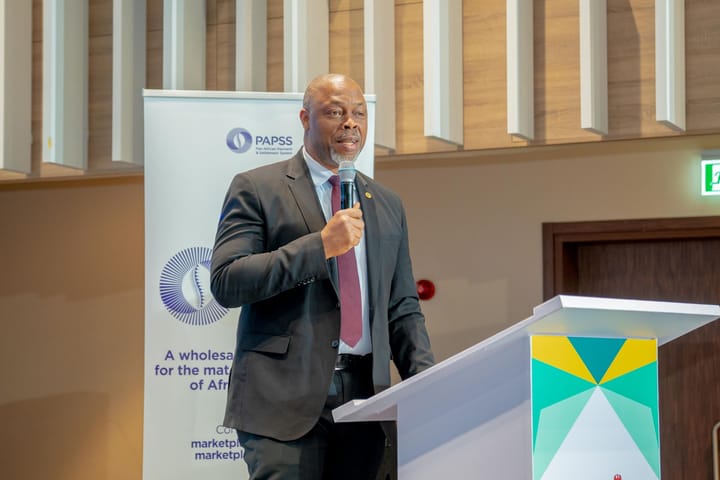Six takeaways from Njoku of Lazerpay’s interview with the Crypto@Scale podcast
In his first interview since the company shut down, Njoku Emmanuel talks about how regulation, high burn rate and his misunderstanding of being product-led played parts in the Lazerpay story.

Emmanuel Njoku, CEO of the now-defunct Lazerpay, whose young age was synonymous with the company’s brand identity, spoke publicly for the first time about his experience running the crypto payment startup.
In an interview with Gwera Kiwana and Justin Norman of the crypto@scale podcast, Njoku recounted his experience starting the company, some roadblocks he faced, mistakes he made and lessons he learned.
Here are six takeaways from the interview.
Njoku’s young age was an advantage for the company
Njoku was just a teenager when he founded Lazerpay, and this fact garnered him and the company a lot of support and attention. According to him, being a teenager was more of an advantage for the company than most people realized — as stakeholders were usually impressed by the product built by a company led by someone so young.
“My age has never come up in any business meeting that I attend … I don’t think the problem was my age. No one ever asked how old I was at the time.
“Instead, I think my age was even a good factor for us because when partners and investors heard how old I was at [that] time, they were really surprised at what we were able to achieve and what I was able to achieve at that young age. So, I would say age was a good factor in the progress of Lazerpay,” he said.
A high burn rate impacted the company more than the bear market
Njoku admitted that the company had a high burn rate from late 2021 to mid-2022. It invested much in product development and security measures such as smart contract auditing. The increased burn rate, Njoku said, contributed to the public perception that the company was severely affected by the bear market of 2022.
Njoku said:
“During the bear market, we actually saw traction on the platform itself … our highest number of transactions and total processed volume at a point were pretty much during the bear market. We saw a huge amount of money moving within and outside Lazerpay.”
He added:
“Our burn [rate] was high, and at the rate [at] which we were growing, it happened that at the time when we needed to scale pretty much because of the volumes we started seeing, that was also the time when we needed to raise more money to actually have enough runway to carry us through the bear market.”
Lazerpay lacked business development and sales structure early on
A gap in Lazerpay’s leadership was the lack of business development, sales strategies and structure early on. The team was primarily focused on product development. Things remained that way until Lazerpay hired Amara Uyanna as the head of partnerships, who brought in the needed business acumen to help the company maximize its revenue-generating opportunities. He said everyone in the organization felt the impact of the structures put in place as their revenue and transaction volumes improved.
Njoku admits he regrets not hiring her earlier. He believes the business strategy and structure she brought would have put the company in better financial standing if she joined them early on.
He said:
“At first, revenue wasn’t on top of my list. In the market, we hired a head of partnership. When she came in, a lot of things around business development and sales changed in the organization. We had a proper sales structure.
“Maybe I should have done that since day one. I think one of my biggest mistakes was not bringing her on early enough. [After hiring her], everyone within the organization could feel [the] change in terms of [revenue]. That was why I said that the bear market was actually the period where we had the highest number of transactions.”
Lack of regulatory clarity in Nigeria contributed to Lazerpay’s failure
According to Njoku, Lazerpay had already onboarded a number of businesses that would do about a million dollars in transactions, potentially translating to tens of thousands of dollars of revenue for Lazerpay. Some of these businesses had integrated Lazerpay’s API into their platforms, but these deals were cut short due to the lack of regulations for cryptocurrencies in Nigeria.
“With respect to selling to enterprise, the major problem around our business not working or us not being able to scale was not [an inability] to sell to enterprise [customers]. We tried selling to enterprise in Nigeria [and there was a willingness on their part].”
This, according to Njoku, was a significant roadblock to scaling.
“Think of the biggest payment gateways you know in Africa or Nigeria. We got into the room with the highest person in the organization. The problem was [that the] compliance [department] always shuts it down.
“The regulatory framework around crypto in Nigeria, which was our core market, was not clear at all, and these enterprise businesses don’t want to put their business in harm or at the mercy of the central bank because they wanted to add crypto to their offerings. So that was the problem, and we realized that late,” he said.
The company was not adamant about a fixed valuation
Techcabal ran a story titled “Inside the shutdown of Lazerpay, the Web3 startup that was high on hope but short on capital.”
An anonymous source told the tech publication that Lazerpay’s fundraising campaign fell through because Njoku and his team wouldn’t budge on valuation.
Njoku says the narrative is false. He admits the company wanted to raise funds at a $15 million-dollar valuation. The startup secured a lead investor and went through the due diligence process at that valuation. However, the story changed when the investor was to wire the funds. The investor said the $15 million valuation no longer worked for them, citing the bear market.
“The thing about us not budging to reduce the valuation is totally false. We had a proposed lead investor, and we were raising at a $15 million-dollar valuation. We signed a term sheet, and [the investor] was doing the due diligence, [which] took a couple of months,” said Njoku
“[When the time came] for them to wire the money, […] they came back saying the market is really bad and the valuation doesn’t work for them anymore, [and] based on their analysis, this is the valuation that works.
He added:
“At that point, valuation didn’t matter to me. I just wanted to save the business. […] So, we did that, reduced the valuation, [and] went back to them [and] they were like they would get back to us [as] they were keen to invest even with a lower valuation.” Njoku said.
The deal with the said lead investor ultimately fell through because neither party was aligned on the investment terms.
There was no long-term financial plan for the company.
Recounting his experience, Njoku said one of his biggest mistakes was not having a long-term financial plan for the business even before raising the first round of funding. He realized that successful entrepreneurs have detailed profitability plans even before they start their first round of funding.
He also admits the company didn’t need to spend as much as it did on several expenses, especially headcount. He believes he hired more people than the company needed. That was due to a knowledge gap in the resources necessary to run the company at different stages.
“One of my biggest mistakes was when raising the first round. I didn’t think about where I needed to be [in terms of business result ] to raise the second round, and I think that’s what founders should actually do. Before you touch that first $1,000 from an investor, you need to have a plan on where [you] need to be to either break even or cover [operational expenses]. I didn’t do that,” he said.



